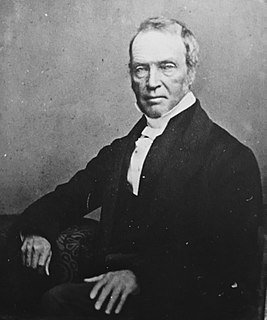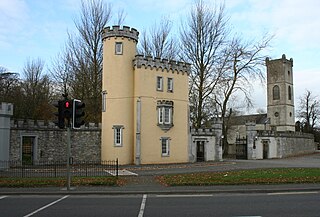In most common law jurisdictions, the attorney general or attorney-general is the main legal advisor to the government. The plural is attorneys general. In some jurisdictions, attorneys general also have executive responsibility for law enforcement, prosecutions or even responsibility for legal affairs generally. In practice, the extent to which the attorney general personally provides legal advice to the government varies between jurisdictions, and even between individual office-holders within the same jurisdiction, often depending on the level and nature of the office-holder's prior legal experience.
The Lord High Chancellor of Ireland was the highest judicial office in Ireland until the establishment of the Irish Free State in 1922. From 1721 to 1801, it was also the highest political office of the Irish Parliament: the Chancellor was Speaker of the Irish House of Lords. The Lord Chancellor was also Lord Keeper of the Great Seal of Ireland. In all three respects, the office mirrored the Lord High Chancellor of Great Britain.

The Law Officers are the senior legal advisors to Her Majesty's Government and devolved executives of the United Kingdom. They are variously referred to as the Attorney General, Solicitor General or Advocate General depending on seniority and geography - though other terms are also in use, such as the Counsel General for Wales. Law Officers in these roles are distinguished by being political appointees, while also being bound by the duties of independence, justice and confidentiality among the other typical professional commitments of lawyers. These roles do not have any direct oversight of prosecutions nor do they directly lead or influence criminal investigations. This is a distinguishing factor between Law Officers and the State Attorneys General of the United States or US Attorney General.

Francis Blackburne PC (Ire) KS was an Irish judge and eventually became Lord Chancellor of Ireland.

The Solicitor-General for Ireland was the holder of an Irish and then United Kingdom government office. The holder was a deputy to the Attorney-General for Ireland, and advised the Crown on Irish legal matters. On rare occasions, there was also a Deputy Attorney-General, who was distinct from the Solicitor-General.At least two holders of the office, Patrick Barnewall (1534–1550) and Sir Roger Wilbraham (1586-1603), played a leading role in Government, although in Barnewall's case this may be partly because he was also King's Serjeant. As with the Solicitor General for England and Wales, the Solicitor-General for Ireland was usually a barrister rather than a solicitor.

The Attorney-General for Ireland was an Irish and then United Kingdom government office-holder. He was senior in rank to the Solicitor-General for Ireland: both advised the Crown on Irish legal matters. With the establishment of the Irish Free State in 1922, the duties of the Attorney-General and Solicitor-General for Ireland were taken over by the Attorney General of Ireland. The office of Solicitor-General for Ireland was abolished for reasons of economy. This led to repeated complaints from the first Attorney General of Ireland, Hugh Kennedy, about the "immense volume of work" which he was now forced to deal with single-handed.
Custos rotulorum is a civic post that is recognised in the United Kingdom and in Jamaica.
Sir Joseph Napier, 1st Baronet was an Irish Conservative Party Member of Parliament (MP) in the United Kingdom Parliament. He was also a barrister and judge, who served briefly as Lord Chancellor of Ireland.

Abraham Brewster PC (Ire) was an Irish judge and Lord Chancellor of Ireland.
Denis Caulfield Heron LL.D QC was an Irish lawyer and politician, who was Catholic Liberal MP for Tipperary, and a senior legal adviser to the English Crown. He was born in Newry, County Down, the eldest son of William Heron, a merchant, and his wife Mary Maguire of Enniskillen. He was educated at Downside Abbey, Stratton-on-the-Fosse, and proceeded to Trinity College Dublin, where he was elected a Scholar.
John Naish, PC (Ire), QC was an Irish lawyer and judge, who held a number of senior offices, including Lord Chancellor of Ireland.

Charles Robert Barry QC, PC was an Irish politician and lawyer who rose to become a Lord Justice of Appeal for Ireland.
This is a list of lawyers who held the rank of serjeant-at-law at the Irish Bar.

Richard Wilson Greene PC, KC (1791–1861) was an Irish barrister and judge.
William Domville (1609–1689) was a leading Irish politician, barrister and Constitutional writer of the Restoration era. Due to the great trust which the English Crown had in him, he served as Attorney General for Ireland throughout the reign of Charles II (1660-1685) and also served briefly in the following reign. It was during his term of office that the Attorney General emerged as pre-eminent legal adviser to the Crown in Ireland.

Rt. Hon. Arthur Moore was an Irish lawyer, judge, and politician.
Sir John Lyndon was an Irish judge and politician of the seventeenth century. He was the first holder of the office of Third Serjeant-at-law, which was created especially for him, apparently as a "consolation prize" for not being made a High Court judge the first time he sought that office.
The Clerk of the Crown and Hanaper was a civil servant within the Irish Chancery in the Dublin Castle administration. His duties corresponded to the offices of Clerk of the Crown and Clerk of the Hanaper in the English Chancery. Latterly, the office's most important functions were to issue writs of election to the Westminster Parliament, both for the Commons and for Irish representative peers in the Lords.
Sir John Bourke Howley (1789-1866) was an Irish barrister and Law Officer who held office as Serjeant-at-law (Ireland) for many years. Despite his obvious desire to be promoted to the Bench, he never became a judge.
James Robinson (1814-1885) was an Irish barrister and Law Officer. He held all three ranks of Serjeant-at-law, but never became a judge.








